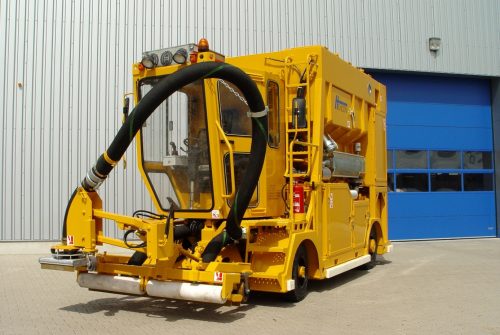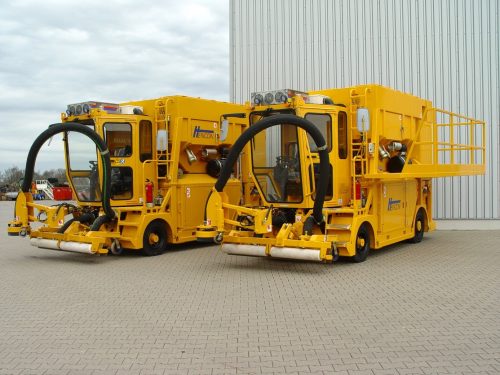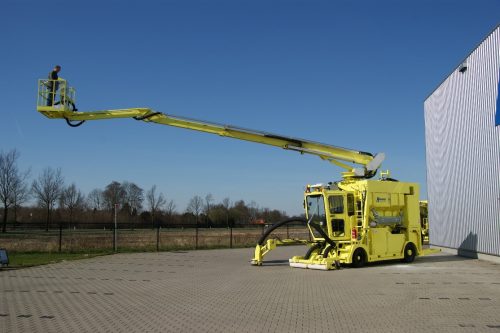The product no one likes but appears uninvited wherever you look: dust.
It is dirty, not very esthetical and above all it is unhealthy. It is problematic when dust becomes a side-effect of production. Lots of industries face that problem. From industrial bakeries to concrete-industry, dealing with dust – or rather: working in it – is a daily fact of life for millions of people.
People who are exposed to dust on a regular basis, will often suffer from all kind of diseases in the long run. Most of them are obviously lung related. Some types of lung diseases caused by the inhalation of dust are called by the general term « pneumoconiosis », better known as « dusty lung ». Other dust particles can be dissolved in the bloodstream. The blood then carries the substance around the body where it may damage other organs (the brain, kidneys etc).
There are official guidelines and official lists mentioning the several types of dust, each indicating the impact that they have on human organs in case of daily exposure, and the list contains lots of products (dust particles) to be found in various industries, including the aluminum industry.
In fact two types of dust need to be described: the types of dust that you actually can see with the naked eye: this is the dust that will be removed by typical cleaning (water, sweepers, vacuum cleaners) and the dust that you don’t see: fine dust. This dust is even more harmful. It destroys the smallest lung cells, with all kind of diseases as a consequence.
Besides the obvious reasons as described above, there might be a danger on a serious explosion as well.
Although dust is not something which is automatically associated with explosions, the danger is real. Under certain circumstances, a dust-explosion can have the amplitude of a dynamite-explosion. In Europe, guidelines have been pointed out to describe and handle those risks (94/9/EG, better known as ATEX 95). One of the conditions which have been recognized to induce a dust-explosion is that the dust needs to be able to bind with oxygen. Besides the usual suspects, such as woodfibers, flour, milk powder and certain chemicals or polymers, also Aluminum and Magnesium have this capacity. The right mix of oxygen and dust, in combination with an ignition, is all what is needed to transform a factory in a fireball. An ignition can be caused by all kind of sources: flames, sparks (welding, electrostatic sparks, …), hot gasses or surfaces, etc.
A dust explosion is often much more powerful than any other type of explosion. The reason behind this, is that a first (lighter) dust explosion can induce other dust to start whirling, which induces a second and even more explosions. This causes a chain reaction which can destroy a building in no time.
Summarizing all the reasons above and talking about green energy, smart industry, improving the safety and healthy environment, dust must be one of our top priorities.
No kidding, what are the advantages of dust?
Well… there is one advantage. A valuable one. Dust is money. The particles, forming dust in aluminum-industry, are recyclable. It can be re-used and it can also be sold.
Dust: how to remove
Knowing that, the question arises how to handle with this inevitable side-material that is spread throughout the complete production environment.
Most of the aluminum plants use sweepers: mobile cleaning equipment, using brushes – with or without water. The type of vehicles that are used for cleaning parks, streets, city-squares etc.
Sweepers are indeed the perfect solution for outside environment because there is an immediate and visible result: dust seems to be removed after the sweeper has gone. In the open, this is the result that customers / users are looking for.
For use in buildings, this type of vehicles do not perform properly. A closer look into the result that has been sorted out, when these machines are being used in a building, is disappointing and poor. In reality, a sweeper only moves the dust – it adds humidity to the dust, then it brushes the dust… to an other place. Or the dust re-appears after humidity has gone.
Outside there is so much dust that removing it all is just not feasible. It is not necessary either – you just don’t want it within certain areas – this is where a sweeper comes into the picture. Inside a building though, you want the dust to be completely removed, therefore a sweeper is not the right solution, only a vacuum cleaner can handle the job. A machine that actually takes away the dust and captures it into a reservoir.
Because of the long tradition that Hencon has with Aluminum Plants, Vacuum cleaners have been in our product range for a few decades already. The Hencon Vacuum cleaner is a machine dedicated to remove dust completely from the factory. Hencon is convinced that a clean environment is also a safer and therefore more effective environment, the Hencon vacuum cleaner is a reflection of that philosophy.

The principle is as simple as it sounds: Hencon Vacuum cleaners suck and absorb all the dust that is in the plant. After that it will captivate the dust in a special container which can be emptied in a designated spot. As mentioned: the dust that has been collected and can be reused or can be sold.
The majority of the industrial vacuum cleaners will never comply to the requirements. Additional challenges need to be taken in consideration: the vast surface of an aluminum plant needs a machine that can work fast enough and has the capacity to transport enough dust in order to not have a discharging break every five minutes. Because of the surface, and the continuity which is needed to work away the dust, comfort for the operator is important as well. Besides this, high temperatures and electromagnetic fields (in potrooms) are specific circumstances in which most of industrial cleaners will not stand very long. Sometimes hot material, or bigger pieces will need to be removed, therefore you need a vacuum cleaner that is really fit to the application.
On top of the described challenges, the maneuverability of the cleaning vehicle is a conditio sine qua non. Dust is a material which has the talent to hide behind and in between spots where a normal industrial cleaner has no access. It is important that also the spaces between the pots and under the pots are cleaned, no matter how narrow and how deep. Under the pots it is unacceptable that dust piles up. Short circuit is the last thing an aluminum factory is waiting for.

Hencon Vacuum cleaners have been developed to meet those particular requirements. Our machines can vacuum the smallest particles and have a very low falling speed (necessary to absorb the dust as good as possible). All types of attachments (nozzle, side shift, etc.) enable the operator to clean every little spot within the cast house and the pot room. The smallest particles of dust will be removed and the operator doesn’t even have to leave the cabin to do his work. The machine will be able to work in combination with other applications (like robo molls, able to dig under the pots in the smallest places)
In the end the dust will be disposed at the exact spot where needed.
The desire to work on a clean environment – without spillage – is something that is taken very seriously by all industries in general, and Hencon sees the dedicated Vacuum Cleaner as our way to contribute to a healthier and safer world. Because of the increasing awareness of the danger of dust (as well as the economic value of it), Hencon is promoting its Vacuum cleaners actively by introducing a new line of Vacuum cleaners which will be available at a very competitive price.
Our new budget product line will be redesigned with an eye on additional visibility, increased comfort and ergonomics in the cabin and reducing the dimensions.
Besides the budget Vacuum cleaner, all other options are available: vacuum cleaners with a double capacity, with a lifting platform, vacuum cleaners designed for in underground mines, hybrid solutions and even a fully electric Vacuum cleaner will be available on demand.

If you would like to talk about dust – and more precisely: how to deal with it in the best possible way – feel free to contact Hencon at www.hencon.com or STAS who is a an exclusive agent of Hencon for Canada (info@stas.com)



